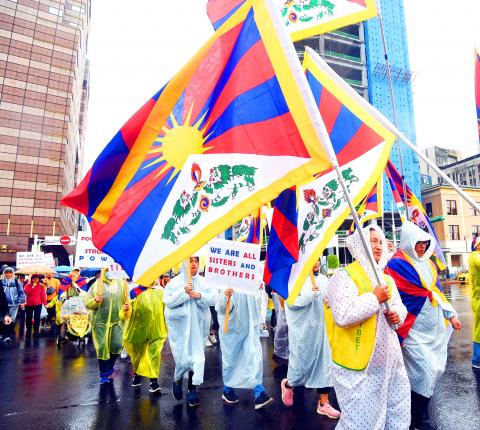Taiwanese marched with Tibetans in the rain in Taipei yesterday to mark the 60th anniversary of the 1959 Tibetan uprising against China, with organizers and politicians highlighting the contrast between freedom and democracy in Taiwan and the situation in Chinese-ruled Tibet.
The march started at the 228 Memorial Park and ended at the Nishi Honganji Relics, a reconstructed Buddhist temple complex in the Ximending (西門町) area, with participants shouting slogans including: “Tibet belongs to Tibetans,” “Chinese military get out of Tibet” and “We want to return to our homeland.”
The annual event was organized by the Taiwan Tibetan Welfare Association’s Tashi Tsering and Tenzin Namdak; Dawa Tsering, chairman of the Tibet Religious Foundation of His Holiness the Dalai Lama; and Regional Tibetan Youth Congress-Taiwan chairman Lobsang Tsewang, among others.

Photo: Fang Pin-chao, Taipei Times
More than 20 Taiwanese organizations took part in the event, while representatives of the Democratic Progressive Party (DPP), the Green Party-Social Democratic Party Alliance and the Free Taiwan Party attended.
No Chinese Nationalist Party (KMT) representative attended.
“China has carried out repression of Tibetans for more than 60 years, but I am proud to say that Tibetans have not given up hope of returning to our homeland,” Tashi said. “Tibetans inside Tibet have never given up the goal of taking back our nation and for the return of the Dalai Lama. Tibetans living in democratic countries are also working toward these goals.”
Tashi said that the 17-point “peace agreement” signed in 1951 in Beijing between representatives of the Dalai Lama and the Chinese government needed to be remembered.
“We remind Tibetans and Taiwanese not to forget this history,” he said. “Less than 10 years after signing the agreement, the Dalai Lama had to escape from Tibet for his safety to exile in India.”
“China wrote in the agreement a promise that Tibetans could preserve and protect their language, and practice their religion and culture, but it all came to nought,” Tashi said.
DPP Secretary-General Luo Wen-jia (羅文嘉) criticized the leaders of the KMT for urging Taiwan to negotiate with Beijing and sign a peace agreement, saying that the result of the 1951 deal was Beijing’s annexation of Tibet.
“Have people not learned the lessons of history, about the bloody repression in Tibet and atrocities committed by the Chinese military 60 years ago?” Luo asked. “How can the KMT dream of talking to a tyrannical regime and asking them to guarantee peace?”
Uighur democracy advocate Wuer Kaixi said that Taiwanese must not believe the authoritarian Beijing government.
“It is foolish in the extreme for politicians in Taiwan to believe that China would keep any of its promises when signing a peace agreement,” Wuer Kaixi said.
“If Taiwan does, then Taiwanese would fall into the depth of hell and perpetual suffering,” he said.
“Taiwan today faces the same situation Tibet faced 60 years ago. A brutal Chinese regime wants to annex a neighboring country by devious means,” he said. “From our experience of promoting democracy in China, it is clear that peace cannot be guaranteed by signing an agreement.”

An essay competition jointly organized by a local writing society and a publisher affiliated with the Chinese Communist Party (CCP) might have contravened the Act Governing Relations Between the People of the Taiwan Area and the Mainland Area (臺灣地區與大陸地區人民關係條例), the Mainland Affairs Council (MAC) said on Thursday. “In this case, the partner organization is clearly an agency under the CCP’s Fujian Provincial Committee,” MAC Deputy Minister and spokesperson Liang Wen-chieh (梁文傑) said at a news briefing in Taipei. “It also involves bringing Taiwanese students to China with all-expenses-paid arrangements to attend award ceremonies and camps,” Liang said. Those two “characteristics” are typically sufficient

A magnitude 5.9 earthquake that struck about 33km off the coast of Hualien City was the "main shock" in a series of quakes in the area, with aftershocks expected over the next three days, the Central Weather Administration (CWA) said yesterday. Prior to the magnitude 5.9 quake shaking most of Taiwan at 6:53pm yesterday, six other earthquakes stronger than a magnitude of 4, starting with a magnitude 5.5 quake at 6:09pm, occurred in the area. CWA Seismological Center Director Wu Chien-fu (吳健富) confirmed that the quakes were all part of the same series and that the magnitude 5.5 temblor was

The brilliant blue waters, thick foliage and bucolic atmosphere on this seemingly idyllic archipelago deep in the Pacific Ocean belie the key role it now plays in a titanic geopolitical struggle. Palau is again on the front line as China, and the US and its allies prepare their forces in an intensifying contest for control over the Asia-Pacific region. The democratic nation of just 17,000 people hosts US-controlled airstrips and soon-to-be-completed radar installations that the US military describes as “critical” to monitoring vast swathes of water and airspace. It is also a key piece of the second island chain, a string of

The Central Weather Administration has issued a heat alert for southeastern Taiwan, warning of temperatures as high as 36°C today, while alerting some coastal areas of strong winds later in the day. Kaohsiung’s Neimen District (內門) and Pingtung County’s Neipu Township (內埔) are under an orange heat alert, which warns of temperatures as high as 36°C for three consecutive days, the CWA said, citing southwest winds. The heat would also extend to Tainan’s Nansi (楠西) and Yujing (玉井) districts, as well as Pingtung’s Gaoshu (高樹), Yanpu (鹽埔) and Majia (瑪家) townships, it said, forecasting highs of up to 36°C in those areas